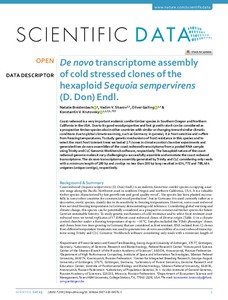De novo transcriptome assembly of cold stressed clones of the hexaploid Sequoia sempervirens (D. Don) Endl.
Скачать файл:
URI (для ссылок/цитирований):
https://elib.sfu-kras.ru/handle/2311/137957Автор:
Breidenbach Natalie
Sharov Vadim V.
Gailing Oliver
Krutovsky Konstantin V.
Дата:
2020Журнал:
Scientific DataКвартиль журнала в Scopus:
даКвартиль журнала в Web of Science:
даАннотация:
Coast redwood is a very important endemic conifer timber species in Southern Oregon and Northern California in the USA. Due to its good wood properties and fast growth rate it can be considered as a prospective timber species also in other countries with similar or changing toward similar climatic conditions due to global climate warming, such as Germany. In general, it is frost sensitive and suffers from freezing temperatures. To study genetic mechanisms of frost resistance in this species and to select the most frost tolerant trees we tested 17 clones in climate control chamber experiments and generated two de novo assemblies of the coast redwood transcriptome from a pooled RNA sample using Trinity and CLC Genomic Workbench software, respectively. The hexaploid nature of the coast redwood genome makes it very challenging to successfully assemble and annotate the coast redwood transcriptome. The de novo transcriptome assembly generated by Trinity and CLC considering only reads with a minimum length of 180 bp and contigs no less than 200 bp long resulted in 634,772 and 788,464 unigenes (unique contigs), respectively. © 2020, The Author(s).

